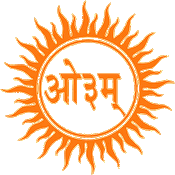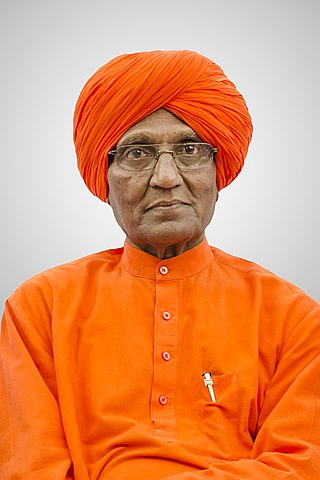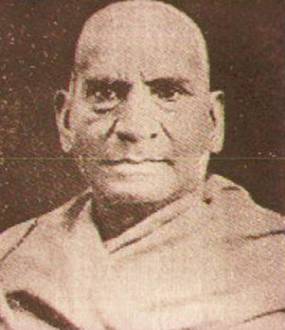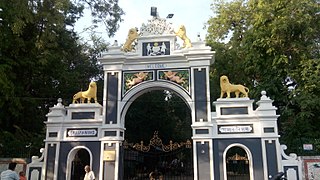This article needs additional citations for verification .(December 2013) |
| |||||
| Centuries: | |||||
|---|---|---|---|---|---|
| Decades: | |||||
| See also: | List of years in India Timeline of Indian history | ||||
Events in the year 1875 in India.
This article needs additional citations for verification .(December 2013) |
| |||||
| Centuries: | |||||
|---|---|---|---|---|---|
| Decades: | |||||
| See also: | List of years in India Timeline of Indian history | ||||
Events in the year 1875 in India.

Arya Samaj is a monotheistic Indian Hindu reform movement that promotes values and practices based on the belief in the infallible authority of the Vedas. The sannyasi (ascetic) Dayanand Saraswati founded the samaj in the 1870s.
Contemporary groups, collectively termed Hindu reform movements, reform Hinduism, neo-Hinduism, or Hindu revivalism, strive to introduce regeneration and reform to Hinduism, both in a religious or spiritual and in a societal sense. The movements started appearing during the Bengali Renaissance.
Events in the year 1870 in India.
Events in the year 1857 in India.
Brahmo Samaj is the societal component of Brahmoism, which began as a monotheistic reformist movement that appeared during the Bengal Renaissance.

The Arya Samaj was the first religious, cultural and educational Fiji Indian organisation established in Fiji. From its inception, in 1904, it attracted the young, educated and progressive Hindus into its fold. During the first three decades of the twentieth century, it was the sole voice of the Indian community in Fiji and as Fiji Indians won political rights, it was not surprising that first Indian members of the Legislative Council were all Arya Samajis. The influence of Arya Samaj over the Indians in Fiji gradually waned as other organisations representing Indians were established but it remained the dominant force in politics until 1959. The modern day Arya Samaj in Fiji still speaks out on issues affecting its members and its activities are visible through the numerous educational institutions that it manages.

Arya Samaj is a Hindu reform movement in South Africa. Like other parts of the world where people of Indian origin are settled, the teachings of Swami Dayananda Saraswati, founder of the Arya Samaj, made their way to South Africa during the beginning of the twentieth century. The Arya Samaj encouraged Indian South Africans to take pride in their heritage and culture and promoted education and social reform.

Swami Agnivesh, was an Indian social activist and the founder of Arya Sabha, a political party based on the principles of Arya Samaj. He also served as a cabinet minister in the state of Haryana. He is best known for his work against bonded labour through the Bonded Labour Liberation Front, which he founded in 1981.

The Arya Samaj was founded in Nairobi on 5 July 1903, at a meeting at the home of Jai Gopal attended by forty-five people. The small group of Arya Samajis immediately began plans for a centre for its members and on 11 September 1903, the foundation for the first Arya Samaj building in East Africa was laid. Today there is a seven-storey building on this site.

Swami Shraddhanand, also known as Mahatma Munshi Ram Vij, was an Arya Samaj sannyasi and an Indian Independence activist who propagated the teachings of Dayananda Saraswati. This included the establishment of educational institutions, like the Gurukul Kangri University, and played a key role on the Sangathan and the Shuddhi (purification), a Hindu reform movement in the 1920s.
Adi Dharm refers to the religion of Adi Brahmo Samaj the first development of Brahmoism and includes those Sadharan Brahmo Samajists who were reintegrated into Brahmoism after the second schism of 1878 at the instance of Devendranath Tagore. This was the first organised casteless movement in British India and reverberated from its heart of Bengal to Assam, Bombay State, Punjab and Madras, Hyderabad, and Bangalore.
Events in the year 1926 in India.
Events in the year 1920 in India.

Gulab Bagh is the largest garden in Udaipur, Rajasthan, India. It is spread over 100 acres (40 ha) of land. The garden has innumerable varieties of roses. Gulab Bagh gets its name from the abundance of rose flowers it has.

The Singh Sabhā Movement, also known as the Singh Sabhā Lehar, was a Sikh movement that began in Punjab in the 1870s in reaction to the proselytising activities of Christians, Hindu reform movements and Muslims. The movement was founded in an era when the Sikh Empire had been dissolved and annexed by the British, the Khalsa had lost its prestige, and mainstream Sikhs were rapidly converting to other religions. The movement's aims were to "propagate the true Sikh religion and restore Sikhism to its pristine glory; to write and distribute historical and religious books of Sikhs; and to propagate Gurmukhi Punjabi through magazines and media." The movement sought to reform Sikhism and bring back into the Sikh fold the apostates who had converted to other religions; as well as to interest the influential British officials in furthering the Sikh community. At the time of its founding, the Singh Sabha policy was to avoid criticism of other religions and political matters.
Nanji Kalidas Mehta, MBE was an Indian industrialist and philanthropist from Gujarat. He found the Mehta Group in British East Africa, with its head office in India. Known as Sheth Nanjibhai. His son Mahendra Mehta, daughter in-law Sunayana Mehta and grandson Jay Mehta now own the Mehta Group.
Yudhvir Singh was an Indian freedom fighter, politician and homeopathic doctor.
Chhalesar is a village in the block and nagar panchayat of Jawan Sikandarpur, Aligarh district in Northern India. It is also known for being the location of the fourth Vedic school ("gurukul") founded in 1870 by the Arya Samaj reform movement. Swami Dayanand also visited here with Thakur Bopal Singh and Thakur Manna Singh.
Swami Achhootanand was a 20th century Indian anti-caste intellectual, writer, and social reformer. A former Arya Samajist, he became disillusioned with the Arya Samaj and established the Adi Hindu movement. He was a poet, critic, dramatist, and historian.
Kashibai Navrange was an Indian social worker and reformer. She started a Milk Fund in the year 1916 for pregnant and lactating mothers under the auspices of the Arya Mahila Samaj. Navrange was the first Indian woman doctor to open her own clinic. She contributed to the field of medical. Kashibai Navrange Road in Mumbai is named after her.